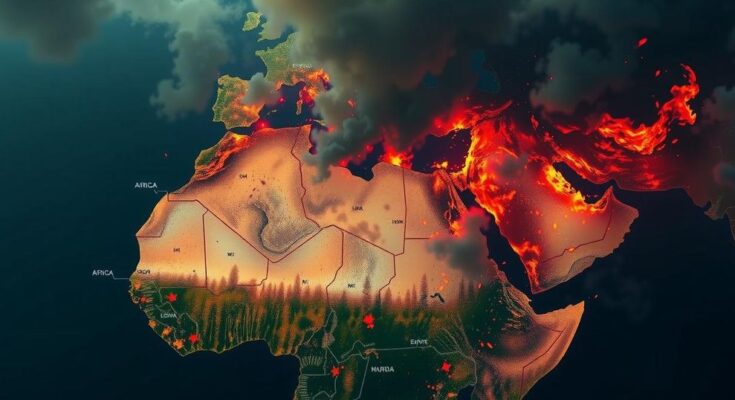This article discusses the rising tensions in the Horn of Africa, particularly Ethiopia, where a fragile peace follows a brutal civil war. Ongoing strife among ethnic groups, coupled with geopolitical interests from regional and global powers, poses a significant risk of renewed conflict that could have far-reaching effects on both the continent and the world.
The Horn of Africa is once again facing escalating tensions, particularly due to the evolving dynamics in Ethiopia. In November 2020, coinciding with the U.S. presidential election, armed conflict erupted between the Ethiopian government and the Tigray region, leading to a protracted and costly war that persisted for two years and threatened the stability of Ethiopia. Though a cessation of hostilities agreement was reached in 2022, numerous issues remain unresolved, notably concerning the return of displaced individuals. The coalition that Ethiopian Prime Minister Abiy Ahmed formed to quell the unrest in Tigray has now fractured, resulting in continued civil strife in both the Amhara and Oromia regions. As the United States finds itself preoccupied with another presidential election and various global conflicts, it is crucial not to underestimate the risks associated with the rising tensions in the Horn of Africa. Prime Minister Abiy Ahmed’s eagerness to establish access to the Red Sea has rekindled historical animosities with neighboring states, particularly with Somalia. His recent negotiations with Somaliland—a self-governing territory seeking independence—have further exacerbated these tensions. In response, Egypt, alarmed by the implications of the Grand Ethiopian Renaissance Dam for the Nile waters, has sought to strengthen ties with Somalia, even supplying arms. Eritrea, aiming to maintain its neighbors’ weaknesses, has also engaged in discussions with Egypt and Somalia. Furthermore, the interest of non-African powers in the Red Sea and Gulf of Aden has intensified. Notably, Turkey has revitalized its relationship with Somalia, while the United Arab Emirates signals continued support for Abiy’s regime. The complex interrelations and historical grievances within this region create a precarious environment, where the potential for miscalculations leading to conflict is alarmingly high. Such developments would initially impact African lives before extending their consequences to the global economy, jeopardizing critical shipping routes and likely prompting significant refugee movements, which would strain neighboring countries. In light of existing humanitarian crises, particularly in Sudan, where civil war has resulted in grave humanitarian consequences, and the ongoing vulnerability of Somalia to al-Shabaab insurgents, the urgency for the United States to facilitate de-escalation and curb proxy conflicts cannot be overstated. A proactive stance is essential to mitigate the potential for violence and instability that could further harm individuals and nations in the region and beyond.
The Horn of Africa has been a region of significant geopolitical concern, influenced by internal strife and external interests. Ethiopia, home to varied ethnic groups, has faced escalating violence and civil conflict, notably in the Tigray region. The conflict arising from the government’s actions against Tigray culminated in a war that lasted for two years, particularly troubling as it coincided with critical electoral processes in the United States. Although some future stability was sought through peace agreements, ongoing tensions threaten to destabilize the broader region. Nearby countries like Somalia, Kenya, and Egypt have vested interests in the evolving dynamics, particularly concerning water security and trade access through the Red Sea and Gulf of Aden, creating a complex web of alliances and rivalries.
The escalating tensions in the Horn of Africa necessitate a focused and urgent response from the international community, particularly the United States. With the fragility of Ethiopia and the complexities involving Somalia, Egypt, and Eritrea, the potential for conflict is alarmingly high. Therefore, it is imperative to prioritize diplomatic efforts aimed at de-escalating tensions, addressing humanitarian needs, and ensuring regional stability, which ultimately affects global economic landscapes and security.
Original Source: www.cfr.org




